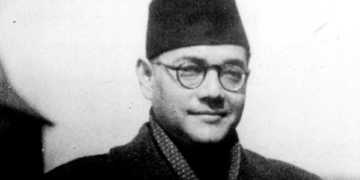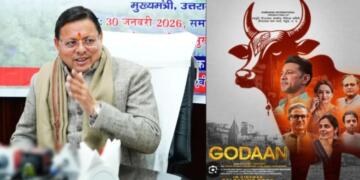
History belongs to the victors, they say. To put it even better, History belongs to the rulers. Those who rule, interpret history and then present it in a way that shows them in positive light. In a country like India, where there seems to be a very limited tradition of history writing, history merges with mythology and mythology with history, so what you have at hand is actually a very good story/poem but seldom a strong historical account. The history of ancient and medieval India is, in many accounts, bereft of a sense of chronology, Kings come in, get out and paens get sung to their glory. In the present age, “saffronization” of History is a subject of discussion amongst our political classes. It is assumed that “saffronization” of History is an attempt to view history with saffron coloured glasses-which certainly is not the case. Against a “saffronized history“, you have a Leftist red history, Islamic Green History, Nazi Black history and what not. The point basically is that like beauty lies in the eyes of the beholder, History lies in the pen of the author. One man’s history can be another man’s fiction.
Which brings us to the point of what India’s history is. Ancient Indian history is defined mostly in terms of the monuments left behind by Kings, by literary accounts of battles fought and folk lore. As mentioned earlier, ancient Indian writers were master story tellers, but poor recorders of history. That situation changed with the advent of Islam in Sindh in 8th century. The conquest of Sindh by Muhammad bin Qasim is described as a battle of establishment of the true faith amongst Heathens by the Chachnama. It records how Qasim was righteous and how the heathens sued for peace and surrendered before Qasim’s ferocity. Chachnama mentions the fate that befell those who resisted. There is no mention of the travails of the natives who had to endure the invasion and see their temples destroyed, their idols shattered and their kinsmen murdered. It does not record the second class status that the natives had to endure, replaced as they were with a foreign race. The invasion is described as a punishment meted out to the Sindhi King, who connived with his pirates and harassed Arab ships. Facts today state indicate that this was a regular imperialist expansion, coming after several failed attempts.
The Ghaznavid and Ghurid invasions leading to the establishment of Delhi Sultanate are similarly described as a victory of Turks and Afghans by medieval historians such as Barani. The plight of the natives is again of no concern. Temples are freely destroyed, taxes are harshly levied, indigents are made out of natives, territories are plundered, women and children are sold as slaves and yet the Sultan is wise, just and heroic. Had any Indian historian of that age written his account of the events of the day, we would read of the great tragedy that befell the land, how Gods deserted their people at their time of need, how the wealth and riches of India were drained and how rivers turned red with all the bloodletting. Yet, all we read is how Delhi Sultanate was the first pan Indian empire, almost stretching from end to end.
Taking a huge leap to the modern times, ask a Congress-affiliated historian to write an account of Emergency. You will read accounts of how discipline was enforced, how trains ran on time, how productivity increased and so on- Anushasan Parva, so to speak. Ask a Leftist/’Saffronite‘ historian for his account and you will hear of suspension of civil rights, an atmosphere of terror, torture and disappearance and what not. And believe it, both are accurate accounts of what emergency really was. Or for that matter, ask a Kashmiri Pandit of his account of the flight from valley- He definitely won’t mention it as a sacrifice from his side for the cause of Azadi.
That is how history is. Always subject to the views of the writer. However, the only way to make history as objective and neutral as possible is to present it keeping the audience as the frame of reference. Without this, history becomes a joke. Imagine how you would feel if the Indian Independence movement was presented as an assault on British sovereignty? Or how, India wronged Pakistan by creating Bangladesh in 1971? If the frame of reference is India and its inhabitants, then the policies of murderous, temple smashing, Jizya levying, plundering Sultans are as detestable as the policies of the British that impoverished the country. In that frame of reference, India’s most ecstatic moment would be winning independence after centuries of servitude and the 1971 defeat inflicted on Pakistan.
“Saffronization” of history is not an attempt to make a myth out of history. It is an attempt to set the frame of reference right, without prejudice to any caste, any community. In fact it is more of Indianization of Indian history. It is unfortunate that in Independent India, the only battle that the Indianizers won against the Secularists was the re-building of Somnath Temple. Other than that, Indianization, even today mocked as “Saffronization” remains a lost cause.






























http://contentwriteups.blogspot.in/2015/07/history-and-controversies.html
History or no history, life
is an unmapped atlas which gets its maps based on our innate attributes, choices,
beliefs, actions, reactions, thoughts, attitudes etc either as individuals or
as a collective group with some identity, and it is our hands to make each one
of these continents as great and as good as possible.
” God
is UNITY but always works in VARIETY” RALPH W.EMERSON
Greatest contribution that
one can make to the pride of ancestry is to not merely give hope for future but
bequeath values, comforts, wisdom, wealth, happiness, great wisdom etc to
posterity and be clear in mind that there is no use merely parading our past
glory [though there are many documented, undocumented, purposely suppressed etc]
while letting the present in constant worry. [1-read it last as foot note]
This is as bad as reacting
to historic blunders with histrionic reactions.
“Saffronization” of history.
Let us
first move away from these media appropriated and projected labels like ‘saffronization’
ejected very often by the greenhorns of red brigade. It is an intentional tool
to divide with ideological label and paid media are master at that, perhaps
only at that as if there are two contrasting groups like saffron versus
secular, previously they were using communal versus secular and in the process
they have distorted the meaning of all these words beyond any sane recognition
by their meaningless usage.
Coming to
the main topic about history, there
are, of course only limited ways of knowing truth of what happened or
supposedly happened in the remote past like DNA studies, archeological samples,
fossil genetic samples, architectural, cultural, literary works etc.
I still cannot understand
terms like prehistoric times. What is meant by that?
Chronology, especially as
used today was something which by itself is a comparatively recent discovery
and adopted as a measuring tool of time for whatever it is worth, along with all the controversies
involved in various methods of calculating time as such.
Is study of history or
mythology important or relevant? Undoubtedly a big yes because at least we can
learn to follow useful things and avoid great mistakes which have caused damage
in various dimensions to everyone, everything and environment.
Are we as human beings
doing that?
Often yes, and sometimes not
doing that for some reasons which are either justifiable or justified or
unjustifiable.
Mostly most of the writings
are subjective or at least not totally objective because of the impact of our inherently
inadequate tools of perception [ http://contentwriteups.blogspot.in/2010/02/real-perception.html%5D;
imprint of our inextricable identity of certain ideological, cultural social,
linguistic, religious, regional influences [http://contentwriteups.blogspot.in/2015/04/change-identity-fixation.html];
inspiration of certain popular trends or instigation of certain forces; added
to these are certain hyper imaginations and exaggerations of the authors as
artists etc.
When all or some of these
factors fall in line with or suit our confirmation bias we lap it up , wrap it
up and write paeans and provide more versions or perversions but when it is otherwise
we tend to portray ourselves as too wise and pillory the versions.
History is after all a
string of facts of purported events, happening etc, and not hypothesis for us
to keep churning till we come to a conclusive discovery or proof, that are joined
together like beads of a chain.
Facts are extremely vital
but they not reveal the truth.
Ayn Rand
seems to view it when she says “We can evade reality, but we cannot evade
the consequences of evading reality.” Even as facts Reality has immense
value as John Adams says, “Facts are stubborn things; and whatever may be
our wishes, our inclinations, or the dictates of our passion, they cannot alter
the state of facts and evidence.”
Jessamyn
West said, “We want the facts to fit the preconceptions. When they don’t
it is easier to ignore the facts than to change the preconceptions”. They have
this tendency to presume some mal intention in everything because of their
perversion and they should always be told what Milton Friedman said, “One of the great
mistakes is to judge policies and programs by their [ presumed-italics mine]
intentions rather than their results”
Contradictions are also because
of human psyche’s penchant for generalizing variety, oversimplifying the
complex, sometimes confusing the motives to be either the means or meaning of
the quest, justifying all means, fear of various kinds, predominance of certain
types of thinking, passing everything through a prism of some popular or
prevailing liking, seeing things with jaundiced vision and prejudiced views,
presuming that we need to judge everything and everyone, applying irrelevant
metrics to evaluate everything rather than evaluating anything through its
inherent merits and so on.
Contradictions are very often camouflaged as dichotomies
and dichotomies are the indoctrinated and engraved part of many domains of life
as Dudley Lynch puts forth very nicely, “The
brain forever has dichotomies on its mind-The ancient Taoists did it with
yin/yang. Religious types with good/evil. Philosophers with mind/matter.
Particle scientists with wave/particle. Psychologists with nature/nurture. Law
officers with good cop/bad cop. On and on and on. You just had to know that it
was only a matter of time before “dualism”—or … harrumph! …
co-eternal binary opposition—infested neuro discussions like kudzu” and
continues “Maybe, as one thoughtful observer has suggested, even as
old dualisms get knocked down, “it seems that there is something about the
wiring of the brain that leads to new dualisms springing up.” Talk about
Whack-a-Mole! That was certainly what the late George Kelly, the father of personal
construct psychology, thought. “Our psychological geometry is a geometry of
dichotomies[italics mine] rather than the geometry of areas envisioned by
the classical logic of concepts, or the geometry of lines envisioned by
classical mathematical geometries.” (Double harrumph!) in his blog {do
not miss to read the comments about George Kelly in the link as well } [ http://www.braintechnologies.com/blog/2010/02/history%E2%80%99s-longest-running-whack-a-mole-game-%E2%80%9Cdualism%E2%80%9D-continues-as-usual-friends-of-the-right-brain-are-kicking-left-brain-posteriors-and-taking-names/%5D
“Across
planes of consciousness, we have to live with the paradox that opposite things
can be simultaneously true.”
― Ram Dass.
“All of us
have our own inner fears, beliefs, opinions. These inner assumptions rule and
govern our lives. A suggestion has no power in and of itself. Its power arises
from the fact that you accept it mentally.”
― Joseph Murphy, The Power of Your Subconscious Mind
Every region, civilization
has certain weaknesses and if that weakness happens to be something that is
used as a bench mark or a measuring yard to evaluate everything then that
weakness really pinches hard on that region or civilization.
Indian civilization’s greatest weakness was
lack of documentation of many great things and coupled with its weakness to
accept documentations provided by others besides its lack of synchronization with
the concomitant trend or thing of greater importance from the late 18th
century till a year ago i.e. total indifference to material/financial/economic/commercial
empowerment of the nation as a whole. As a result, inevitably, we allowed ourselves
to be at the mercy of others. So, most of our claims of great discovery and
counter claims and attacks are inevitable. Obviously because hungry stomach
creates a biological set up that does not allow the chemistry of mind to bother
about any history or philosophy or geography as its priority is purely
biological.
A great work of history,
though too idealistic, almost very difficult , would be to create a synthesis
of various factors and contextually find a relevance from a huge cauldron consisting of a mixture many
of the following- various events, impacts of some great individual souls, evolutionary
biology, evolutionary sociology, evolutionary changes in the march of
civilization, evolutionary political trends, ideas, philosophical inquiries,
psychological perception, emotional reactions, discoveries and inventions that
have contributed to life enormously and the selective static or stiffness or
suppleness of various religious edicts etc- and weave a very meaningful
relationship among these or decipher a pattern of occurrence or recurrence of
certain events or evolution of certain factors or emanation of certain ideas or
the emergence of certain individuals etc
Though there cannot be any
single great work manifesting this amount idealistic expectations, still, there
have been some extraordinary souls like Guy Murchie who
have made a modest but great attempt to chronicle history in this way.
http://contentwriteups.blogspot.in/2013/07/guy-murchie.html
Jacob Bronowski says, “Every animal leaves traces
of what it was; man alone leaves traces of what he created” and not only this
human beings are much more wise as William Gladstone observes, “To comprehend a
man’s life, it is necessary to know not merely what he does but also what he
purposely leaves undone. There is a limit to the work that can be got out of a
human body or a human brain, and he is a wise man who wastes no energy on
pursuits for which he is not fitted; and he is still wiser who, among the
things that he can do well, chooses and resolutely follows the best.”
This is inevitable as Maria
Mitchell says, “The world of learning is
so broad, and the human soul is so limited in power! We reach forth and strain
every nerve, but we seize only a bit of the curtain that hides the infinite
from us.”
“By contemplating the relationship
between the objects in our lives and the forces that created them, we can
arrive at the ‘thing itself’ and know its inherent identity.” ~ Dennis William Hauck [here the word inherent identity must be taken as
meaning ‘attribute of’]
As
Sherlock Holmes declares, “From a drop of water a logician could infer the
possibility of an Atlantic or a Niagra without having seen or heard of one or
the other. So, all life is a great chain, the nature of which is known whenever
we are shown a link of it.”
Very few have documented
history without their view or observations, if they had done so no one would
have bothered to read history.
Even the most extraordinary
historians like Will Durant
couples Will and Ariel [in my opinion they deserve Nobel Prize for
literature] have expressed their excellent and fairly unbiased observations on
facts and have ensured that they have never distorted facts to suit their
opinions.
http://contentwriteups.blogspot.in/2012/09/the-saint-who-documented-facts-and-ideas.html
http://contentwriteups.blogspot.in/2013/07/will-durant-and-india.html
For that matter the great Arnold J. Toynbee’s history books in several volumes also is
spiced with his observations and commentaries.
History for a united world-by
Edward Herbert Dance
Our Fragmented World-by
Ronald Harvey
Here I would like to quote Simone Weil, French social
philosopher, mystic and activist in her work ‘Gravity and Grace’
“The world is the closed door. It is a barrier. And at
the same time it is the way through.
Two prisoners whose cells adjoin communicate with each other by knocking on the
wall. The wall is the thing which separates them but it is also their means of
communication. … Every separation is a link.”
When talking about boundaries , barriers etc we cannot
avoid these very meaningful messages reiterating the vagueness of boundaries
from Ken Wilber in his work ‘ No Boundary: Eastern and Western Approaches
to Personal Growth’ like these two small pieces, “ Even to say ‘reality is
no-boundary awareness’ is still to create a distinction between boundaries and
no-boundary! So we have to keep in mind the great difficulty involved with
dualistic language. That “reality is no-boundary” is true enough,
provided we remember that no-boundary awareness is a direct, immediate, and
nonverbal awareness, and not a mere philosophical theory. It is for these
reasons that the mystic-sages stress that reality lies beyond names and forms,
words and thoughts, divisions and boundaries. Beyond all boundaries lies the
real world of Suchness, the Void, the Dharmakaya, Tao, Brahman, the Godhead.
And in the world of suchness, there is neither good nor bad, saint nor sinner,
birth nor death, for in the world of suchness there are no boundaries.”
And “The ultimate metaphysical secret, if we dare to state it
so simply, is that there are no boundaries in the Universe. Boundaries are
illusions, products not of Reality, but of the way we map and edit Reality. And
while it is fine to map out the territory, it is fatal to confuse the
two.”
“Everything
changes as you move through three stages of awareness:
first, that beliefs are the result of conditions;
second, that beliefs are the cause of conditions;
and third, that beliefs are themselves conditions.”
― Eric Micha’el Leventhal
What can we do about things
like these?
“For example as early as 601 AD
in the Vaghbata complied by Indian physicians there is mention about the
medicinal herb ‘RAUWOLFIA SERPENTINA’ and only in 1949 in the prestigious
British Heart Journal an Indian physician Rustom Jal Vakil published that
powdered root of ‘RAUWOLFIA SERPENTINA is very effective in lowering
blood pressure. Then in 1952 Reserpine was isolated by Swiss chemist employed
by CIBA under the direction of Emil Schlitter who produced pure crystals of
active ingredient in ‘RAUWOLFIA SERPENTINA and Boston heart specialist Robert
Wallace Wilkins observed that Reserpine not only reduced blood pressure but
also reduced anxiety. Now to whom will you give the Patents’? Leave alone all
the controversies surrounding the product itself.
Unfortunately the things are
further complicated, especially in the field of science, by the nexus and
fights between industry and academia. While one of it has credibility the other
has incredible influence. They generate with the help of media and publicity wings
many questions of morality versus utility etc and the ultimate causality is
truth.
Justin Pollard’s book titled BOFINOLOGY
which reveals the ugly ‘the real stories behind our greatest scientific
discoveries’ like for example ‘”Archimedes never said ‘Eureka’ and hated baths
anyway”, Thales “credited as ‘the father of science’, whose only real claim to
fame is that he often fell into ditches” and this book reveals how eleven
people have claimed to have invented the stream engine etc
However, beyond all these dirty politics and
polluting trends and catastrophic cultures ,still , if there is any field of
activity that has helped humanity’s advance more tangibly meaningful and life
in general more comfortable and brought people out of their caves of blind beliefs
and trite traditions and helped them to see and savor the world with ease and
in better ways than all the rest the credit must go and still goes to
scientific inventions, discoveries and the multiple technologies that they have
given to the world. In short it is a supra religion, along with bold
philosophical inquiries, which has pushed aside the many useless diatribes of
centuries of religious edicts, narrow ethnocentric pronouncements and bluffs of
history which were irrelevant to life.
And we would all do well to
remember at the basic level we are, as we mostly identify ourselves with our physical
self, are after all biochemical organism which has to decay or die or disappear
i.e. it is mortal.
[1] http://contentwriteups.blogspot.in/2015/03/singing-our-past-glory-popular-refrain.html
For further reading visit
New Year with a New
Realization of Reality http://contentwriteups.blogspot.in/2013/12/new-year-with-new-realization-of-reality.html
http://www.scribd.com/doc/189819608/New-Year-With-a-New-Realization-of-Reality1011
http://contentwriteups.blogspot.in/2015/07/history-and-controversies.html